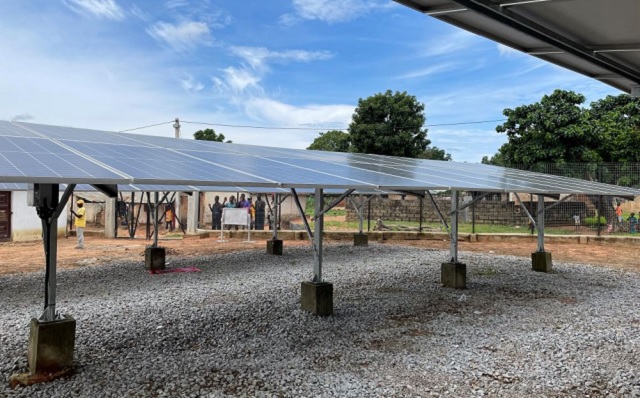
Across Africa, effects of climate change are deepening gaps in access to food, water, and energy
COMMENT | HAKAINDE HICHILEMA | With vast arable lands, rich reserves of critical minerals, and almost endless solar and wind power potential, Africa could practically be the world’s engine room. Many of its economies continue to be propelled by improved business environments from ongoing policy and regulatory reforms, as well as by an expanded pool of skilled human capital.
With the resources and most of the tools in place, the continent has what it needs to become an economic powerhouse. Even with these strengths, however, most African countries face a dire threat from climate change. The consequences of adverse climate conditions include deepening access gaps for food, water, and energy, exacerbated by heavy debt burdens and high levels of unemployment and poverty.
The upcoming United Nations Climate Change Conference (COP29) in Azerbaijan is expected to assess the issue of climate security from all possible angles. The hope is to offer a way forward, especially for Africa – the most heavily affected continent.
Like other southern African countries, my homeland, Zambia, recently suffered its worst drought in 40 years, leading me to declare a national emergency. Our assessment of the situation showed that we would need US$940.6 million to provide relief to nearly half of Zambia’s 20 million people. Almost one million hectares of planted maize – our staple food – was lost. Pasture and surface water for livestock dried up, and grasslands for wildlife disappeared.
The drought also hit our electricity sector, triggering a loss of more than 500 megawatts of hydroelectric power – nearly one-fifth of Zambia’s generating capacity – which led to unforeseen power cuts. The outages affected everyone – hospitals, schools, and other critical institutions, in addition to homes and businesses.
Similar scenarios have played out across the continent, owing to frequent and severe droughts, heat waves, floods, and cyclones. Zambians are still rattled from Cyclone Ana, which swept across several neighbouring countries in 2022, washing away homes, roads, bridges, and power lines. And climate shocks are not only piling financial pressure on African governments; shrinking natural resources, social disruptions, and mass displacements are also heightening the risk of conflicts.
Thus, climate change has become a national-security threat. It is hampering countries’ efforts to reach their food-, energy-, and water-security targets, while regularly damaging their infrastructure. Making matters worse, legacy debt obligations have left many governments with little fiscal space.
As a result, climate change could push up to 130 million more people into poverty globally by 2030, reversing the hard-won gains made over the past few decades. Should this happen, the Sustainable Development Goals (SDGs) would become little more than a mirage.
COP29 therefore must deliver ambitious financing commitments, on terms that will improve conditions for African countries as we navigate the climate crisis. We are confronting a problem that was largely caused by rich countries in Europe and America, through their heavily polluting industries and fossil-fuel-based economic growth.
Africa can provide only around 10% of the US$2.4 trillion in climate finance that it will need by 2030. That means business as usual is a recipe for disaster. Besides adequately capitalizing existing climate adaptation, mitigation, and “loss and damage” funds, the world must come together to overhaul the global financial architecture to ensure that the gap is closed through grants and concessionary financing. Only then can we reconcile our climate and development goals without sliding deeper into debt.
To stand a chance against the forces of nature, our power stations, grid networks, roads, bridges, rail links, and other critical infrastructure must be modernized. If left unchecked, the effects of climate change will widen our energy gaps further. Globally, 18 of the 20 countries with the least access to electricity are in Sub-Saharan Africa, where population growth continues to outpace new energy infrastructure.
Around 571 million people in the region lacked access to electricity in 2022, up from 566 million in 2010. At the same time, 79% of the Sub-Saharan African population relies on heavily polluting fuels for cooking. Indoor cooking remains a silent death trap, with adverse long-term health effects, particularly among women and children.
Despite these challenges, it is our duty as leaders – together with our development partners and the private sector – to ensure a better future for the next generation. My administration launched Zambia’s 1000+ Minigrids Initiative not only to increase access to modern energy, but also to spark more productive uses of electricity in rural communities. At the same time, we continue to extend the national grid across the country, delivering power from cheaper and cleaner renewable sources.
Given that the average global costs of solar and onshore wind have fallen by more than one-half over the past decade, integrated energy solutions that combine the advantages of both centralized and decentralized approaches could address a wide range of energy needs across Africa. For example, solar-powered water pumps (for irrigation), cold chains (for longer food shelf-life), and agri-processing machinery would boost incomes and jobs in rural communities, also enhancing our climate resilience and food security.
If harnessed sustainably, Africa’s rich mineral resources – including cobalt, copper, lithium, and other critical reserves – will drive the continent’s industrialization and electrification agenda, while supporting the rest of the world in the transition to a net-zero economy. There has been a global surge in demand for batteries, electric vehicles, and renewable-energy equipment. African mineral-producing countries could claim a bigger share of these lucrative markets beyond raw materials, but they must be bold and not shrink from the opportunity. To do so, the nexus between energy, food, water, and industrial systems in a rapidly changing climate should be on every government’s radar.
****

Hakainde Hichilema is President of Zambia
Source: Project Syndicate
 The Independent Uganda: You get the Truth we Pay the Price
The Independent Uganda: You get the Truth we Pay the Price

